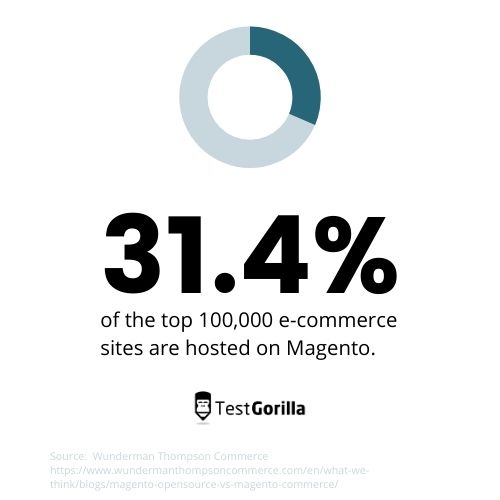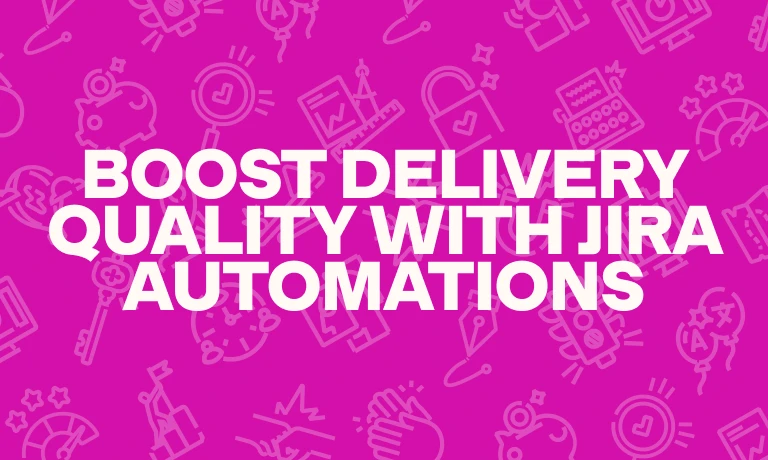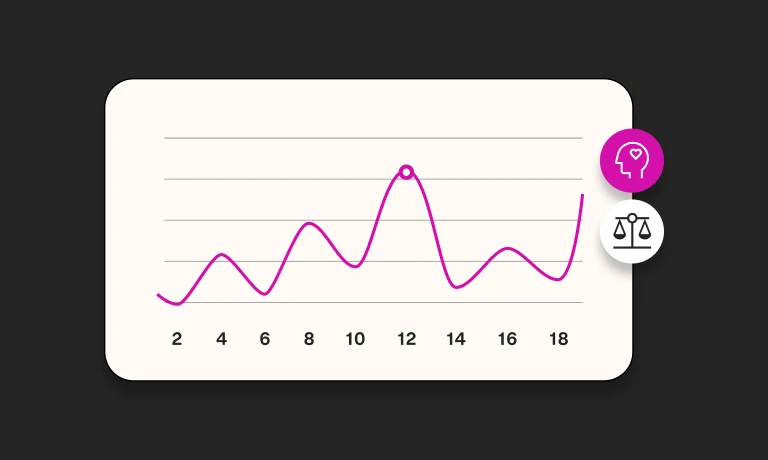According to research in 2017, 31.4% of the top 100,000 e-commerce sites are hosted on Magento. If your site is hosted on Magento or you want to migrate to Magento, this article will help you understand how to identify the right Magento developer for you and your business based on the specific gaps you want to fill in your existing team.
Table of contents
How to identify what kind of developer you need
Regardless of the platform you are utilizing, it’s good to have some working knowledge of the differences between front-end and back-end development, as this will help you understand your team’s strengths and the gaps you may need to fill through hiring.
A simple division you can conceptualize is that front-end developers handle the client-facing segments of your website. In contrast, back-end developers handle the data and frameworks that ensure smooth behind-the-scenes operations.
Front End Developers
As mentioned briefly before, front-end developers are primarily focused on your site’s visible elements. These are the parts of your site that site visitors and clients interact with directly. They are responsible for your site’s navigation and layout, and highly-skilled front-end developers can ensure that users find your site’s interface intuitive and easy to use.
They also focus much more on your site’s aesthetic and user experience, which can be a huge differentiating factor between an average business and a well-performing one. Visually appealing sites may help to capture more viewers and convert them into clients. And a pleasant user experience supported by a strong product will secure loyal repeat clients for your business.
If you are searching for a front-end Magento developer to complement your current team’s needs, they should be proficient in the main front-end programming languages such as HTML, CSS, and JavaScript. They should also be familiar with typography and color theory to create eye-catching yet functional designs for your site.
Back End Developers
Back-end developers complement their front-end counterparts by ensuring that the technical elements of your platform run smoothly. If you already have a strong in-house design and user experience team, hiring a back-end developer would certainly make a well-rounded team. While clients typically do not directly interact with back-end portions of the site, these elements are equally important to ensure that your platform functions smoothly.
Strong back-end developers are tasked with crafting the website’s technical architecture and storing and processing data from clients and visitors on your site. In terms of building a robust site that can handle large volumes of visitors, safely store user data, and provide accurate analytics, a back-end developer who is highly skilled in coding is crucial.
If your existing team is not sufficiently proficient in back-end programming and lacks experience with Magento, this might be a good opportunity to seek a back-end developer who has Magento experience to kill two birds with one stone.
Back-end developers must be proficient in server-side languages such as Ruby, Python, Java, and .Net to build the site itself, as well as tools like SQL Server to connect these elements to the front-end of the site and ensure that the server, the site, and the database are all tightly linked to one another.
It is certainly also an option to seek out a developer who is skilled at handling both the front-end and back-end. However, it’s worth assessing your present team and identifying the competencies that are currently lacking so that your hiring decisions can be made intentionally to build a well-rounded team and complement existing members.
Outsourcing vs. in-house hiring
The last choice you need to make in deciding what type of Magento developer you are looking for is whether you’d like to outsource the job to a freelancer or a dedicated agency or bring someone on board full-time.
One key consideration that may impact this decision is the scale of your business. Would the workload be manageable for someone working on it part-time or in conjunction with other projects? If your business is already at a substantial scale or if you’re looking to expand soon, would you prefer their undivided attention on your site instead?
Both choices have their benefits — one gives your hiring team more control over the specifics you are looking for and allows you to develop your working arrangement one-on-one, whereas relying on an agency allows you to tap into talented developers that their company has already screened.
Working with an agency may also offer you the flexibility to work with different team members rather than a single developer. With both types of hiring, you can still implement skills assessments and other hiring strategies that we will discuss further in the rest of the article.
Skills Magento developers need
Technical expertise
It goes without saying that the Magento expert you are looking to hire should have a strong working knowledge of the platform and the necessary skills to navigate it. In addition to competencies in the relevant programming languages listed in the previous section, it may also be highly beneficial for a candidate to possess work experience and understand the industry’s best practices.
Magento as a platform is written entirely in PHP, so regardless of whether you are hiring a front-end or back-end developer, their fluency in this programming language is essential.
Familiarity with other languages may be necessary as well, depending on the functions of your platform. To ensure that the candidate possesses the necessary technical expertise, it may be good to see if they have official certifications of courses or boot camps they have attended to support the experience and knowledge they claim to have.
Project management
While it is true that the candidates you seek must have the requisite technical knowledge, it is not sufficient for that to be their only skill. You may want to keep an eye out for candidates who can contribute added value in project management, as this skillset is useful regardless of whether the Magento development is a solo job for a single developer or a team effort that requires more collaboration between team members.
Having a strong understanding of project management allows developers to gain a good macro-level understanding of their team’s operations and ongoing projects.
This would equip them with a better comprehension of the timeline and deadlines they need to meet and ensure that your developers can effectively delegate tasks to members of the development team or see how their role and responsibilities fit within the organization’s goals and vision.
Understanding the larger-scale operations of the business also ensures that your Magento developer can respond to interruptions or obstacles in their working process in a manner that aligns with the needs and limitations your company is working within.
Interpersonal communication
Communication is a crucial skill for all roles and would certainly be a valuable skill for any candidate to possess. For Magento developers, communication is essential when most of your team may not have a full working understanding of the platform.
From the very beginning of the hiring process and their initial on-boarding onto your team, they need to understand your business’s goals and needs. This requires active listening and the use of incisive and directed questions to clarify any vague details they do not fully understand.
Further on in their work, the developer needs to be able to simplify the functions of the platform and explain them to the rest of your team in an easily understandable manner and interpret their queries and instructions accurately.
Creativity and innovation
Creativity is a highly valued attribute to look for in the developers you interview as well. Particularly for front-end developers, having pronounced creative instincts and the ability to innovate make them more effective in their role.
Creative and visionary front-end developers will be able to design sites for your company that are both aesthetically pleasing and intuitive to use while simultaneously preserving some unique qualities to differentiate it from other key players in your industry.
While that may be the most straightforward application of creativity in this role, it is not solely limited to design and visual appeal. Back-end developers often have to be creative and innovative as well, as this allows them to approach obstacles in programming with flexibility and an open mind.
So it will help if you look for a developer who knows how to think outside of the box, as their adaptability will allow them to find innovative solutions regardless of the challenges or competing demands they face in the role.
The best insights on HR and recruitment, delivered to your inbox.
Biweekly updates. No spam. Unsubscribe any time.
How to hire the right Magento developer
Now that you know what skills to include in your Magento developer job description, you can then design your hiring process to assess potential candidates per this skillset. The basics of traditional hiring tend to rely on resumes and interviews, with the potential addition of reference-checking.
While this does offer you a comprehensive understanding of the candidate, there may be cases where the information gleaned here inaccurately represents the candidate in their present state. Hence, it is worth considering adding these additional hiring steps to identify the best Magento developer for your company.
Ask about previous projects
One element you can consider prioritizing as part of your interview process is asking about their past projects, especially ones that have utilized Magento. Details of their responsibilities and deliverables in these projects will shed some light on job responsibilities that they can confidently perform in your company.
Looking into the projects on your own, whether that is through browsing sites they have helped to develop in the past or speaking to the candidate’s previous employers, will give you a more concrete understanding of the quality of their work, as well as potentially giving you more insight into their working style.
If they have past projects that specifically revolved around Magento, this is an excellent means for you to gauge their fluency and competency with the platform. This may be particularly crucial if you are only looking to bring on a single developer, as that individual would need substantial skills and experience to fulfill the role’s requirements alone.
If the developer does not have the longest or most robust history with the platform, inquiring about past projects can still be of tremendous value. The framing of your questions can instead focus on learning points they could attain through these past experiences.
This helps to highlight their growth mindset and their ability to pick up new skills along the way — having a passionate developer who is willing and able to improve on their skills continually may even be more desirable than a relatively experienced one who is unwilling to change his working style or habits for your project as needed.
Skills tests
Most employers currently are content with relying on resumes, detailed interviews, and calling up past references for the entirety of their hiring concerns. However, this may not fully account for the qualities and competencies the candidate is bringing to your company at present.
There is always the risk of a candidate exaggerating their skills on their resume or falsely claiming competencies they do not actually have. They may also use friends or family members as fake references for projects where they didn’t do well.
However, the reverse problem may also exist, where details of the candidate on paper may not match the growth they have achieved. Candidates may have forgotten to include programming courses they have taken up to expand their knowledge and familiarity with skills crucial to the job opening or have pursued these skills in a self-directed manner without formal certifications. In these cases, records from the past do not accurately capture their competency levels at present.
One easy way to sidestep either over-or under-estimating your candidate based on the information available to you in resumes and references is by implementing objectively-scored skills tests as part of your hiring process.
This may include tests on their familiarity with the Magento platform or specific coding languages like CSS and HTML. You may also want to use this opportunity to see if the candidate is more suited for a front-end or back-end developer role to best complement your existing team.
Skills tests that focus on more intangible elements such as culture fit or problem-solving may also allow you to independently assess these traits that may otherwise be difficult to ascertain via traditional hiring processes.
Paid trial projects
One final option you can consider before offering your shortlisted candidate a full-time role is launching a paid trial project with the candidates you are most interested in. Since this is a temporary role that allows you to observe their skills and suitability for your team in the workplace, it can serve as the final determining factor to differentiate the various highly skilled candidates you have shortlisted after interviews and skills assessments have taken place.
A paid trial project would entail a scaled-down version of the job responsibilities they would take on in the full-time role.
This offers both parties, namely the hiring manager and the candidate, to evaluate if the working relationship would be a suitable and constructive one for the long term. It also has much lower stakes than jumping into a full-time contract from the start due to the short-term and temporary nature of the project.
The most crucial thing to keep in mind for this paid trial project is to assign them tasks that will best help you estimate their performance on elements of the job they are applying for. It is also equally important to weigh their deliverables and their willingness to accept feedback and improve on the work delivered at the end.
By examining their performance in this trial arrangement, you can then see if their work outcomes match the promises and estimates they have confidently given during the interview process.
Get the most out of Magento
Magento is evidently highly popular and has become a leading e-commerce platform over the past decade. It offers your business incredible opportunities to expand and advance further, especially with its high customizability and SEO capabilities. To fully utilize this expansive and customizable platform, it makes sense to bring a strong Magento developer onto your team.
Based on these suggestions of key traits you should be seeking in your Magento candidates and the holistic hiring process we have described, you will hopefully be able to find the right fit to deliver the boost your business needs with ease.
You've scrolled this far
Why not try TestGorilla for free, and see what happens when you put skills first.



















